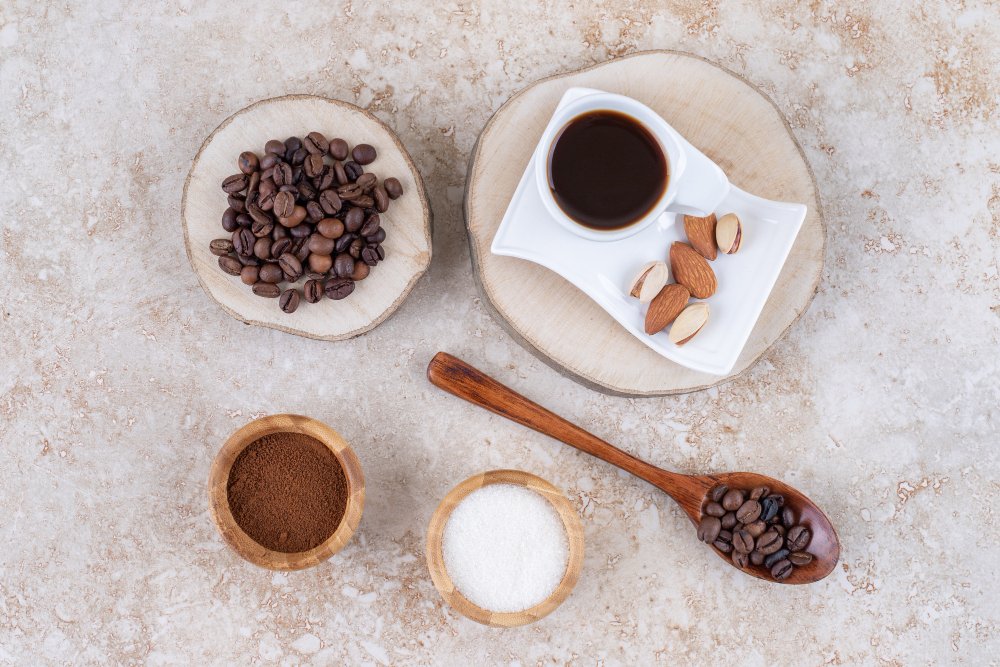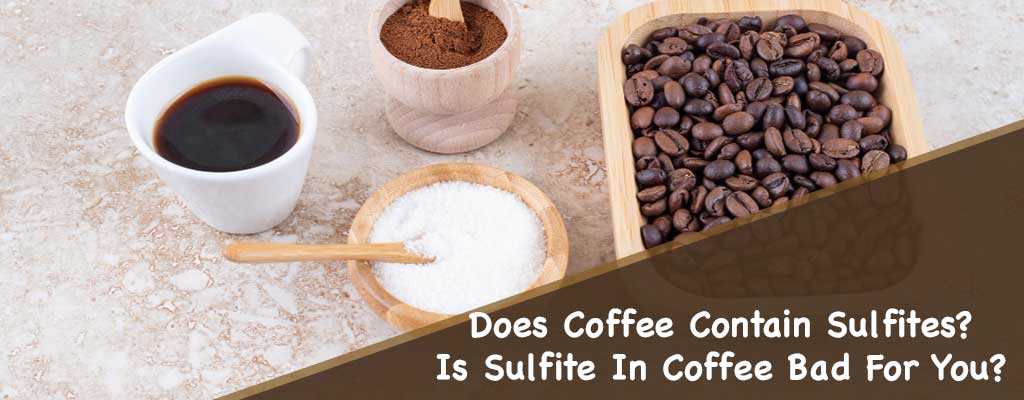But what about coffee? Does Coffee Contain Sulfites? In this blog post, we are going to explore the answer and provide advice for those with sulfite sensitivities looking to enjoy their morning cup o’ joe without triggering any adverse reactions.
If you have recently been diagnosed with a sulfite sensitivity, you’ve likely heard health professionals recommend that you check the labels of packaged foods to make sure they don’t contain sulfites.
Does Coffee Contain Sulfites?
Coffee has some interesting ingredients that are not commonly discussed, such as sulfites. Coffee does contain sulfites although the amount is smaller than what can be found in other foods and beverages.
This raises the question if these sulfites present a risk to consumers’ health, or if it’s really nothing to worry about. The truth of the matter is that sulfites generally aren’t bad for you, but they can cause allergic reactions in some people.
It’s important to do your own research and talk to your doctor to decide whether or not coffee with sulfites would be safe for you. Coffee is enjoyed by many people around the world and thus understanding what’s in your cup can bring better health decisions when it comes to choosing your ideal beverage.
What is Coffee Contain Sulfites?

Sulfites are naturally occurring compounds found in a variety of food and beverage products. In coffee, sulfites are present as sulfur dioxide, which is added during the roasting process to help preserve flavor and color.
Sulfites can also be added to coffee as a preservative or clarifying agent after it has been processed.
Related article: Who Makes Farmers Select Coffee?
Is Sulfite In Coffee Bad For You?
For the majority of people, sulfites in coffee are not bad for you. Sulfites are safe when consumed in small amounts.
However, those with a sulfite allergy or sensitivity may experience adverse reactions when consuming foods containing sulfites.
Symptoms may include hives, itching, wheezing, and difficulty breathing. If you experience any of these symptoms after drinking coffee, it is important to talk to your doctor right away.
What are the symptoms of sulfite intolerance?
Symptoms of sulfite intolerance can include hives, itchiness, swelling of the lips, throat or tongue, difficulty breathing, and even anaphylaxis in severe cases.
If you experience any adverse reactions after consuming products containing sulfites, it is important to consult with your doctor immediately.
Additionally, opting for organic and fair-trade certified products can help reduce the amount of sulfites present in your cup.
What problems do sulfites cause?
Sulfites have been known to cause allergic reactions in those with sulfite allergies or sensitivities. These reactions can range from mild discomfort to more serious conditions such as anaphylaxis.
Additionally, sulfites can act as a preservative and prevent the natural fermentation process of certain food products, which could lead to spoilage. It is important to do your own research and talk to your doctor to determine if coffee with sulfites would be safe for you.
How to Coffee Contain Sulfites?

To reduce the amount of sulfites in your coffee, opt for organic, fair-trade products. Organic coffee is grown without the use of synthetic fertilizers and pesticides, which eliminates the need to add sulfites during processing.
Additionally, opting for fair trade certified beans ensures that you are supporting farmers who are paid a living wage. Both of these steps can help you enjoy a cup of coffee without worrying about sulfites.
What are Sulfites?
Sulfites are naturally occurring sulfur compounds that are found in a variety of food and beverage products. These compounds can also be added to products during processing as a preservative or clarifying agent.
Sulfites are generally safe when consumed in small amounts, but those with allergies or sensitivities should avoid consuming foods containing sulfites as it could trigger an adverse reaction. It is important to do your own research and talk to your doctor to determine if coffee with sulfites would be safe for you.
Are Sulfites dangerous?
Sulfites are generally not dangerous when consumed in small amounts. However, those with a sulfite allergy or sensitivity should avoid consuming products containing sulfites as it could trigger an adverse reaction.
It is important to do your own research and talk to your doctor to determine if coffee with sulfites would be safe for you. Additionally, opting for organic, fair-trade coffee can help reduce the amount of sulfites present in your cup.
How much coffee should you drink?
It is important to remember that while moderate amounts of coffee can be beneficial, drinking too much can also have negative health effects.
Generally, no more than 3-4 cups per day is recommended. Additionally, individuals may need to modify their daily intake depending on other factors such as pregnancy or underlying medical conditions. It is best to speak with your doctor to determine how much coffee is right for you.
What Is Decaf Coffee?
Decaf coffee is a type of coffee that has had its caffeine content reduced by up to 97%. It still contains the same flavor, aroma, and acidity as regular coffee but with significantly less caffeine.
Decaffeinated coffees are available in both ground form and pods for single-serve brewing systems. If you’re looking to enjoy all the benefits of coffee without the caffeine, decaf may be the right choice for you.
Why Don’t We Drink Decaf Coffee?
The reasons for not drinking decaf vary from person to person. Some may prefer the taste of regular coffee or just want the extra boost that comes with caffeine.
Others may be sensitive to caffeine and opt for decaffeinated varieties in order to avoid potential adverse side effects. Ultimately, it is a personal choice and everyone should find the type of coffee that works best for them.
Are Decaf Coffees Better For Your Health?
Decaf coffees offer the same health benefits as regular coffee but without the caffeine. Therefore, they can still provide antioxidants and other beneficial compounds while avoiding any potential adverse effects from consuming too much caffeine.
Additionally, opting for organic or fair trade certified decaf coffees is the best way to ensure you are getting the highest quality product.
FAQs
What drinks contain sulfites?
Many types of alcoholic beverages, sodas, and processed foods contain sulfites. Examples of these include beer, wine, cider, certain soft drinks and juices, dried fruits, and condiments such as ketchup or salsa.
Is Decaf Coffee Better For You?
Decaffeinated coffees offer the same health benefits as regular coffee but without the caffeine. Therefore, they can still provide antioxidants and other beneficial compounds while avoiding any potential adverse effects from consuming too much caffeine.
Additionally, opting for organic or fair trade certified decaf coffees is the best way to ensure you are getting the highest quality product.
Are Coffee With Sulfites Safe To Drink?
Yes, coffee with sulfites can be enjoyed safely in moderation as long as individual sensitivities and allergies are taken into consideration. Decaffeinated coffees offer an alternative for those looking to avoid caffeine entirely.
Is Coffee An Allergen?
Coffee itself is not an allergen, but some people may be sensitive to certain compounds found in coffee such as sulfites. Therefore, it is important to take into consideration any sensitivities or allergies you may have before consuming coffee with sulfites. Additionally, those with asthma and other respiratory conditions should talk to their doctor about potential adverse effects from drinking coffee with sulfites.
Are There Benefits To Drinking Decaffeinated Coffee?
Yes, decaffeinated coffees still provide antioxidants and other beneficial compounds while avoiding any potential adverse effects from consuming too much caffeine. Additionally, opting for organic or fair trade certified decaf coffees is the best way to ensure you are getting the highest quality product.
Can People With Allergies Drink Decaffeinated Coffee?
Yes, people with allergies can drink decaffeinated coffee, as it does not contain the same compounds found in regular coffee with sulfites. However, it is still important to take into consideration any sensitivities or allergies you may have before consuming any type of caffeinated beverage.
Is coffee high in Sulphur?
No, coffee does not contain high levels of sulfur. However, some sulfites are present in the roasting process which can cause adverse reactions in those with sensitivities or allergies to sulfites. Therefore, it is advised to take into consideration any sensitivities or allergies you may have before consuming coffee with sulfites.
Does Starbucks coffee contain sulfites?
Yes, Starbucks coffee contains sulfites due to the roasting process. Therefore, it is advised to take into consideration any sensitivities or allergies you may have before consuming Starbucks coffee with sulfites. Additionally, those with asthma and other respiratory conditions should talk to their doctor about potential adverse effects from drinking coffee with sulfites.
Does tea contain sulphites?
Yes, some teas contain sulfites due to the processing and aging of certain types of tea. However, not all teas contain sulfites, so it is important to check the label before consuming any type of tea. Additionally, those with sensitivities or allergies should avoid drinking tea containing sulfites in order to prevent any adverse reactions.
Conclusion
If you have a sulfite allergy, it’s important to know that coffee does contain sulfites. However, the levels of sulfites in coffee are generally low and shouldn’t pose a problem for most people.
If you’re concerned about your does coffee contain sulfites? – Is Sulfite In Coffee Bad For You? You can always opt for decaf coffee or another type of caffeine-free beverage.
I’m Jeff Olson, and I love coffee. In fact, I’m something of a professional about coffee. I own and operate coffeemachinenes.com, one of the web’s top resources for everything coffee-related. I’m also an avid home barista, and enjoy experimenting with different brewing methods and flavor profiles. When I’m not nerding out about all things coffee, you can find me playing guitar or spending time with my wife and kids.

